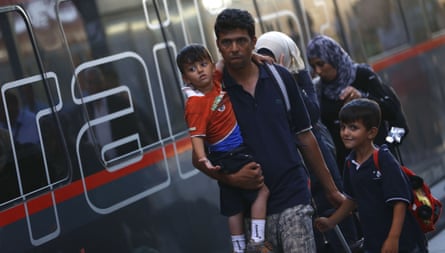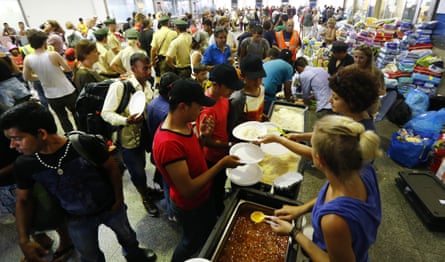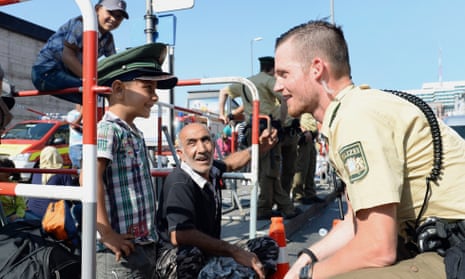Ahmed stands outside Munich’s central station, kicking the pavement and sipping from a bottle of water. He arrived on Tuesday from Keleti station in Budapest on a train that, in his words, was so overcrowded “we fell out on to the platform when they opened the doors”.
The 19-year-old Syrian is relieved to be in Almaniya, as he calls it, using the Arabic word for Germany, after an often hazardous two-week trek. But his happiness is tainted by the fact that his older brother Hasan did not manage to get on the train.
He says: “It was so full, and I lost him in the masses. I can do nothing but wait for him here so we can apply for asylum together. I don’t want to get sent to a reception centre in the middle of nowhere and be unable to find him again.”
Ahmed has so far avoided being picked up by the police. He managed to steer clear of them when he got off the train and they are now so busy with meeting the scores of refugees coming off trains that they are unlikely to notice another stranded soul.

His hopes rest on Hasan being allowed to get on a Germany-bound train. He reckons if the Hungarian authorities were able to decide on Monday to send the refugees to Germany, resulting in more than 3,700 arriving in Munich, surely they can do so again.
The brothers paid €49 (£36) each for the one-way journey, which took seven and a half hours. “We had been going to take a taxi for €500,” he says, referring to the service provided by smugglers, who drop refugees off at the Austrian-German border in overcrowded, ramshackle vehicles.
“But then when we heard that the Hungarians were letting people get on the train, we thought ‘why waste the money and take such a risk if they’re letting us do this?’”
Any fears Ahmed may have that his brother might now be picked up by smugglers in Budapest – “I heard about the people that have died of suffocation in lorries” – are assuaged, he says, by knowing “he couldn’t afford to pay them”.
Throughout the day, trains bring a constant stream of refugees to Munich via Austria and Italy. While not as many manage to come from Hungary, due to Budapest’s clampdown, several hundred have still made it by mid-afternoon. Groups of police officers standing around in the main hall head towards each of the trains as they arrive. They have been told in advance by the conductors on board that refugees are travelling in them.
For most of the refugees, their steps on to platforms 11, 12 and 13 are their first on German soil. “Where have you come from?”, a young policeman asks a family who have just got off the 10.25am train from Vienna. “Syria,” replies 40-year-old Alaa, a hotel receptionist from the south-west city of Daraa.
Dressed in a check shirt and carrying a small backpack containing everything owned by he and his wife Samah, 27, who is cradling their five-month-old daughter Leem, Alaa describes some of their 22-day journey from Daraa to Turkey, including the “horrible” bellum boat journey they took to Greece before continuing on through Macedonia, Serbia, Hungary and Austria.
He says he was beaten by the police in Macedonia, revealing a dark bruise on his shoulder, and that the Hungarian police stole his money. He had to pay for the journey in two parts of $2,400 (£1,566) and €3,000 per person. The couple revised any ideas they previously had about staying in Austria following the announcement last week by Angela Merkel, the German chancellor, that any Syrian arriving in Germany would be granted asylum.
Alaa says: “After that we just thought of Austria as a way station, and Germany as our main goal.” He gives his account, ignoring a police officer ordering him to “stop talking and hurry up”, while being escorted in a big group to a cordoned-off part of the entrance area on the south side of the station, where the family are to be registered. Under handwritten signs reading “welcome to Germany” in English and Arabic, volunteers hand him and Samah bottles of water from a supermarket trolley and bars of chocolate. There is even a baby pack for Leem containing nappies, baby cream, wet wipes and a jar of baby food.
Arben Arden, a cleaner for Deutsche Bahn who emigrated from Albania to Germany 20 years ago, is dripping with sweat, having sorted the rubbish left behind following the recent departure of a new group to a reception centre.
“There’s such sadness in their eyes,” he says. “They’re in a filthy state. We have to disinfect everything when they leave.” Urging Germans to rise to the challenge of helping integrate the 800,000 asylum seekers due to arrive in Germany this year, Merkel said: “German thoroughness is super, but what we need now is German flexibility.”

Some spoke drily of this exhortation. One commentator asked: “Since when have Germans been flexible?” The Süddeutsche Zeitung newspaper said it was as if Merkel had returned from her holidays “injected with a southern European nonchalance”.
But the trait was certainly on full display among the volunteers who had organised themselves on Facebook and were at the station handing out provisions and basic toiletries that had been donated by the citizens of Munich and local shop owners.
So many donations had been received by Tuesday afternoon, the police had to issue an appeal for people to stop. Johannes Stahl, 18, who took the train to Munich from his hometown of Aichach, about 50km away, on hearing on the news that thousands of refugees had arrived at Munich station and help was needed, says: “We’re learning as we go along, and trying to react as fast as we can to the needs people tell us they have, including things like nappies and cream for babies’ raw bottoms.”
Dressed in an orange safety jacket and shorts, the nursing student is now part of an impromptu network of volunteers working round the clock. He is at the start of a 6am to 8pm shift, and calls his mother to tell her he will not be back home before Thursday.
Elsewhere, the fire brigade has activated extra hydrants at the station to ensure there is a sufficient supply of water. Some firefighters are handing out bananas and chocolate to the refugees. Commuters and holidaymakers – some wearing traditional Bavarian dirndl dresses, others pushing mountain bikes – approach with gifts of fruit juice and bread rolls they have spontaneously bought at the station’s kiosks.
Umbrellas that Dieter Reiter, the mayor of Munich, organised on Tuesday to help shade the new arrivals from the baking heat as they waited to be registered, are on being used on Wednesday to shelter them from heavy rain showers. Lists of what is needed are pinned to the wall: the items include dictionaries, rucksacks, toothbrushes and bicycles.
Doctors assessing the medical needs of the newcomers, especially the children, say that while it is not immediately obvious when they clamber from the trains, and often beam on being greeted with gifts of cuddly toys from passersby, about one in five are suffering from post-traumatic stress disorder. Many have tooth decay and most are insufficiently inoculated.

In the main hall, a group from the refugee charity Willkommen in München (Welcome to Munich) hold placards bearing the messages “welcome” and “we can show you where to register” in five languages. Outside the station, confused tourists ask the police where the regular buses are: those that normally take visitors to the Pinakothek art gallery or the airport. A volunteer replies: “You’ll have to go a bit further down the road. The bus stop is being used for the refugees for now.”
The shuttle service is taking the newcomers to reception centres in and around Munich. No one appears to complain. A night train manager who has witnessed first hand Europe’s migration crisis unfolding over the past three years on the routes he regularly travels between Italy, Hungary and Munich, says he has seen how the police in Germany have grown far more tolerant.
Asking not to be named, he says: “It seems the more they have contact with them, the more empathy they have. Time was the police used to throw Syrian families off the train. Now they’re handing out chocolate bars to them. I think that change in attitude goes for most Germans as a whole”.
When the 2.34pm Railjet arrives on platform 12 from Keleti, a grandmother eating carrot cake in a Starbucks overlooking the platform almost drops her fork. “Oh my goodness,” she exclaims to her two young grandsons. “They’re coming from Budapest after all.”
About 100 refugees, most from Syria, some from Iraq, slowly descend the train, all of them with noticeably little luggage, many clutching babies wrapped in blankets. A Yazidi man called Osama, from northern Iraq, dressed in a wooly hat and red canvas shoes, says: “I lost my ID papers, they fell in the water when I took the boat from Turkey to Greece. But don’t worry, I’m not like that Osama,” he jokes, talking in the same breath of how tired he is, although admitting that his five-day journey – for which he says he paid smugglers $4,500 (£2940)– was much shorter than those of most of his fellow passengers.
He is one of the few who does not want to stay in Germany, but is desperate to get to Belgium to meet up with his best friend. A policewoman tells him: “Don’t worry, after you’ve registered, you’re likely to be free to go where you want.” Most people inside the Starbucks are too involved in their laptops and mobile phones to notice to the unusual scenes outside.
An Interrailer napping on a bench remains oblivious to the lively exchanges going on between the new arrivals and the police, who try to establish where they have come from. Kajan Sultan, 33, tells them: “Mostly they’re from Syria, they are tired and anxious.”

Sultan, from northern Iraq, who has lived in Germany for nine years, has come to the station to volunteer his services as a translator of Arabic, Kurdish and Persian into German. He says: “I’ve seen some horrible cases of people having been separated between here and Budapest, sometimes even parents from their young children.”
Increasingly, as it rises to the challenge of absorbing a far greater number of refugees than any other European nation, there is a feeling in Germany that the country has changed in a single summer. And with that, the status of someone like Sultan, who for years has had the task of cleaning Germany’s offices, or selling kebabs, and has suddenly become an unofficial diplomat or mediator thanks to his vital communication skills. The police noticeably hang on his every word. An elderly man comes to platform 13 as a train from Verona pulls in, carrying another large group, mainly consisting of young Afghan men. He says to Sultan: “I have brought two of my old shirts. Who can I give them to?”
Carsten Neubert, a police spokesman, says: “The mood is relaxed. We can cope. The numbers coming in today are in fact nothing unusual – put in the context of the last three months.”
But some of the arrivals go unnoticed. Samad, a 17-year-old from Kunduz in Afghanistan – one of a group of six Afghan men and boys who have arrived without fanfare on a train from Passau on platform 25 – slips past a group of police officers into the crowds of travellers. He explains in broken English how he paid smugglers $7,000 to get him here. The final stretch was spent in a van, which ended when the driver let him out at the side of the road in Passau, from where he managed to find the train station and get to Munich. He says the entire journey took two months “swimming, walking; I am tired”. Dressed in a bedraggled green sweater and looking thin and tired, he adds: “But this is Almaniya. Now I have security.”
